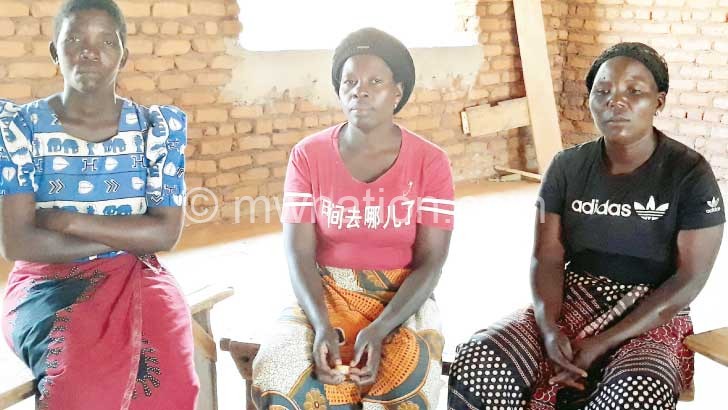Saving girls amid Covid
Efforts to protect girls from risky practices, including child marriages and teen pregnancies, remain fragile with lax law enforcement of laws and policies.
Mother groups in Namatubi, Traditional Authority Mwabulambya in Chitipa District are working closely with the area’s child protection network to make laws work for the good of boys and girls.
During a visit, Lucia Simovwe, the network’s lead mother, was briefing fellow child protectors on how to handle violations of children’s rights, including teen pregnancies and pregnancies involving girls below 18.
She constantly visits various communities to sensitise parents and children to the importance of educating girls as well as dangers of child marriages and teen pregnancies.
However, Simovwe is concerned that many girls in the rural locality quit school for marriage before their 18th birthdays. The Malawi Demographic and Health Survey (MDHS) shows that almost half of Malawian women marry before reaching the legal marriageable age.

“We hear of girls elsewhere working in government or leading community development projects. But for ours, it is a dream we can only achieve if early marriages are eliminated and girls stay in school,” she says.
Restrictions to roll back the coronavirus pandemic have not deterred Simovwe and her colleagues from visiting families reported to have allowed minors to marry. They work with village heads to enforce child protection by-laws.
The rural community registered eight child marriages since March when the government closed schools to reduce coronavirus spread.
“We have by-laws that still apply even though the children are out of school. Every parent whose child falls pregnant or goes into marriage is fined a goat,” says Simovwe.
The mother group’s work helps community members, even children, understand the dangers of risky sexual acts that result in school dropout rates, teen pregnancies, child marriages and sexually transmitted infections, including HIV.
“We have to continue this work, including our meetings to assess on child protection issues because the pandemic will end, but we cannot leave our children at risk of all forms of child abuse,” Simovwe says.
The mother groups’ efforts to create safe spaces for girls have given rise to study clubs to support girls with learning difficulties.
Magdalena Musaku, a Form One student at Namatubi Community Day Secondary School, works closely with the child protection network.
She dreams of becoming a police officer to enforce laws and safeguard rights of children, particularly girls.
“I don’t see a lot of police officers coming to investigate cases of child abuse, especially girls impregnated by older men” she says.
Magdalena wants an end to cultural setbacks that force girls to quit schooling. She reckons her area is short on role models and mentors to give girls signposts to success.
“This is why most girls lose focus and concentration on their education,” she explains.
With the closure of schools, Magdalena and her peers meet to discuss academic work in study clubs formed to keep learners active until schools reopen.
“When classes resume, it will be easy for us to cope. The clubs also help us stay away from risky sexual practices,” she says.
Namatubi Child Protection Network’s work receives funding from Lusubilo Community Care Centre.
Makangila Mbale, project officer at Lusubilo, commends members of the network for their dedication and inroads to safeguard children’s rights.
He urges them to remain vigilant in the push to eliminate child marriages and teen marriages, which are surging during the school closure created by the pandemic discovered in China nine month ago.
“Despite the pandemic, don’t overlook child protection and promoting girls rights,” Mbale says
According to Unicef, Malawi has the world’s 12th largest prevalence of child marriages—with 42 percent of women marrying before the age of 18, according to MDHS. The nationwide survey shows a tenth of these marry before their 15th birthday.
The coronavirus pandemic and precautions have disrupted schooling, which lessens girls’ risk of marrying young and falling pregnant.
A girl who stays in school focuses more on achieving her academic qualifications and career goals, delaying her first pregnancy or marriage in the process.
This also enhances her chances and earnings in life.
However, the closure of schools has exposed gaps in child protection systems, including parenting, as all regions report a rise in teen pregnancy and child marriage.
Girls Not Brides Alliance, a global partnership to end child marriages, reports that many factors that drive child marriages in stable environments are exacerbated in emergency settings as community structures put their work on hold to address the causes of the emergency.
The challenges include disruptions in schooling and loss of household income that may lead girls to transactional sex.
The alliance’s policy brief on the coronavirus crisis recommends that all players in the humanitarian response and recovery should ensure their activities do not lead to or perpetuate further discrimination, abuse, violence, neglect or exploitation, including the practice of early and forced marriage.
As coronavirus slows national efforts to empower adolescent girls and young women, Simovwe hopes that the restrictions will not halt their efforts to ensure that no girl is left behind.





